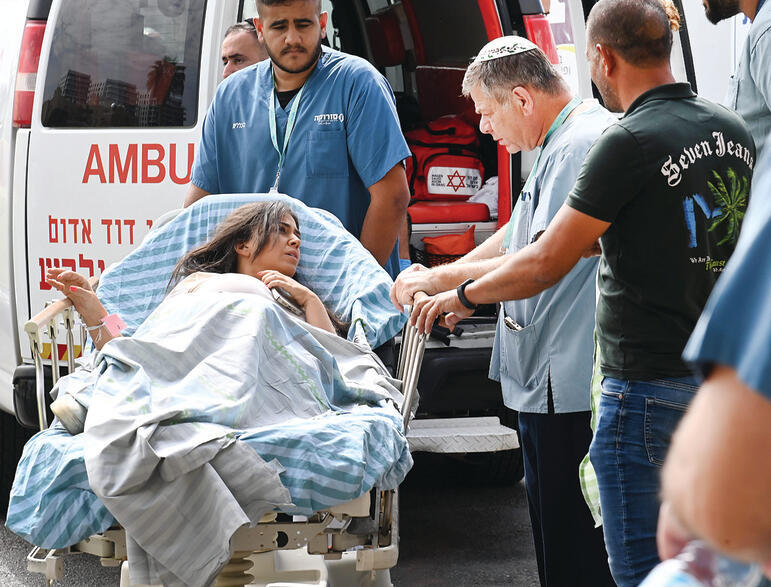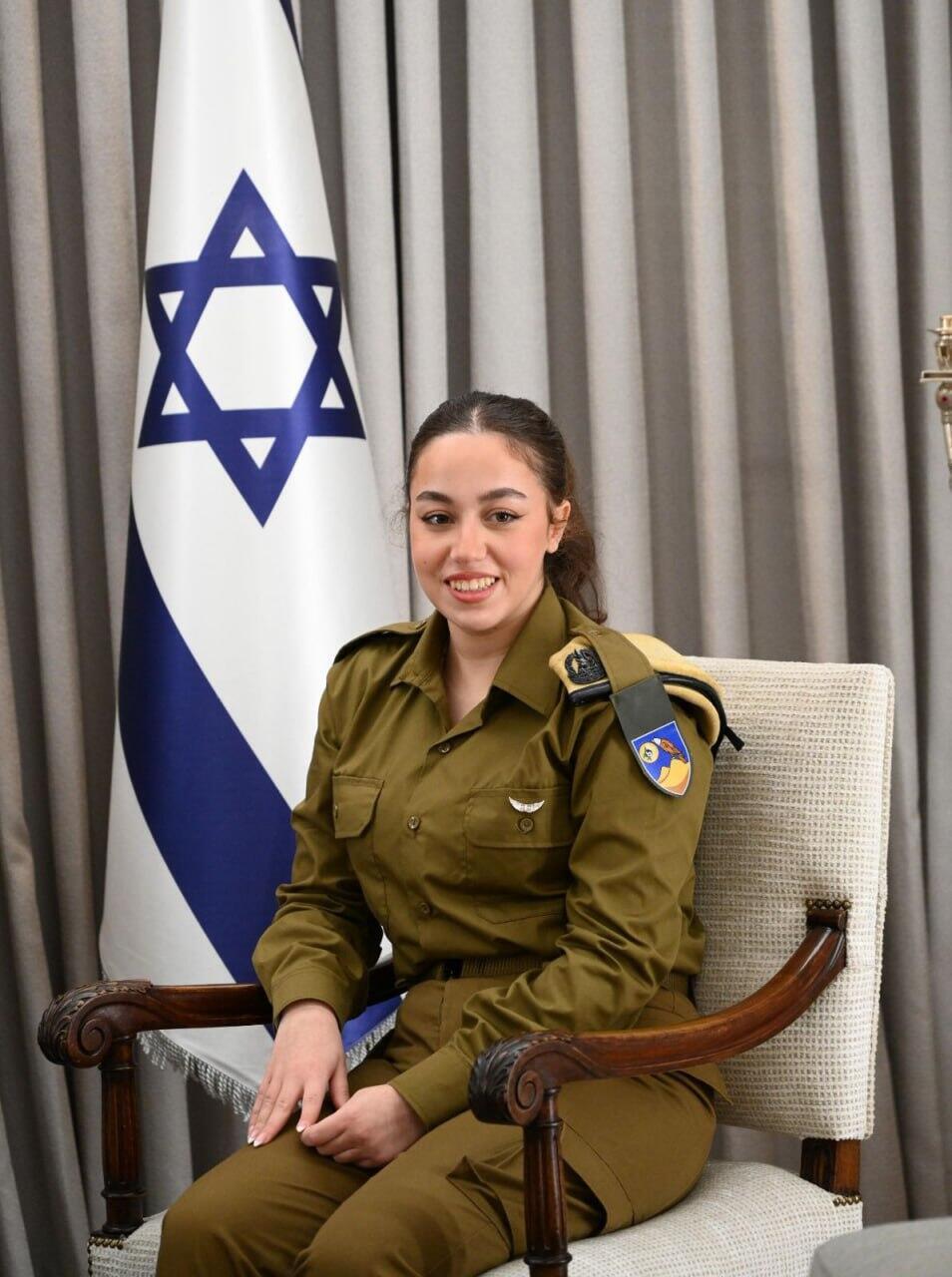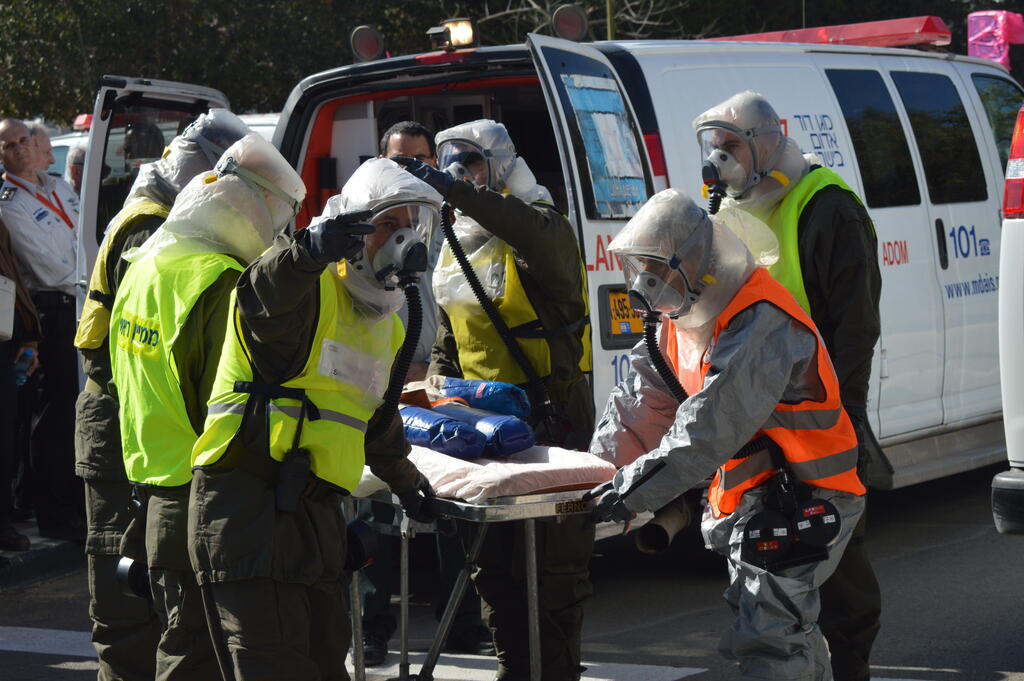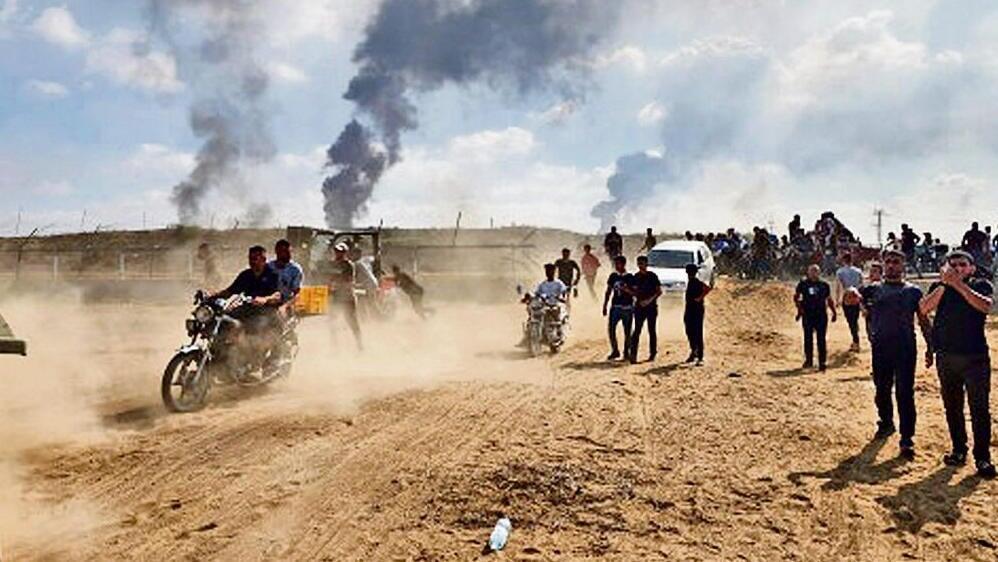Dr. Dan Schwarzfuchs, director of the emergency department at Soroka Medical Center and deputy director of the hospital, who was selected to light a torch at the Independence Day ceremony, last week made his way to Kibbutz Alumim. He knows the route by heart, having served as the family physician for this small southern community for 23 years. He visits twice a week to check on sick children, monitor the health of adults, prescribe medications and write prescriptions.
However, this visit was different. It was the first time since October 7 that Dr. Schwarzfuchs and his patients returned to the clinic in the kibbutz, which had been damaged and was the first to reopen in a border-adjacent community.
"In recent months, I've been treating the community in Netanya, where they were evacuated," he recalls. "As soon as people started returning to Alumim, so did I. I spent two Saturdays here with my wife. When enough families returned, I decided to reopen the clinic. We cleaned up, placed some plants and the place looks better than before."
Didn't you have doubts about returning?
"Some people strongly advised me against it, but I went without any fear. Going back was crucial. It's part of our recovery, another small brick in the wall. I told people, 'I'm here. You don't need to go to Netanya to see me.' The young families with children stayed in Netanya until the end of the school year. From now on, I'll be commuting back and forth."
Like many good things, his relationship with Alumim began by chance. "One of my teachers at Soroka, who managed the clinic, needed to take a six-month leave and feared he wouldn't be reinstated. He asked me to take over the kibbutz in his place for six months. I agreed immediately. After six months, he saw everyone was satisfied and told me to stay."
During this time, he has treated three generations of patients. "It's incredibly rewarding. I know the people and their respective situations. I examine the children and grandchildren. My kids know everyone. We're part of this place. Being a doctor in a close-knit community isn't easy. It's usually either a tremendous success or a complete failure. Someone joked with me this week, suggesting that after I retire as a doctor, I should stay on as the internal secretary. It seems I've succeeded."
Over the years, Schwarzfuchs, who lives in Be'er Sheva, has formed deep personal connections in the kibbutz. This is why, on the day when terrorists rampaged through the peaceful community, killing 23 Thai workers in the dairy farm and kidnapping two, the kibbutz leaders immediately called him for advice on treating the injured. "At first, I didn't understand the situation," he recalls. "I was busy with my duties in the emergency room. When the first wounded person arrived, I told the nurse, 'Bandage him and keep him with you. Don't come over; it's crazy here.'
"Shortly after, a severely wounded young man from the kibbutz arrived at Soroka. He was a company commander in the Armored Corps and a father of four. We intubated him, inserted a chest tube, and sent him straight to surgery. Later, another wounded, an 80-year-old man with a bullet in his abdomen, arrived. In total, four injured people from the kibbutz came to us that day. One of them messaged me on WhatsApp today: 'I was your 204th patient in the ER.'"
How is the community coping after the trauma?
"There are challenges. People have gone through tough experiences. We're treating bereaved parents and siblings. It's a new kind of struggle. I tell everyone I speak to: from now on, when you examine a patient, you must ask them where they were on October 7. It doesn't matter where they live, even if it's Tel Aviv."
Are you referring to doctors?
"Not exclusively. It applies to all fields. I was invited to lecture to 195 school principals about the lessons from that day. I told them, 'Ask every teacher where they were.' As a principal, you need to know what your staff experienced during that time. Maybe they were in the reserves for five months, and their child started wetting the bed again?"
There's no need to ask Schwarzfuchs where he was on October 7, as his answer is well-known. At 6:40 a.m., while most of us were still trying to understand why the Home Front Command's sirens were blaring non-stop, he was already at Soroka's ER, his professional domain for the past nine years.
As the floodgates open
"When the sirens started, I called the hospital's head nurse to start implementing the emergency protocol (moving non-protected departments to safe areas), and within minutes, I was on my way to the hospital. When I arrived, I saw the night shift nurses leaving. I told them, 'You all stay.' So, at the very start of this event, even before we understood what was happening, I already had a double shift available.
"The next calls were to the hospital director, who also arrived, and my friend, the security officer of the Sdot Negev Regional Council, who was near Kibbutz Sa'ad Junction. He told me, 'I can't talk,' and I heard gunfire in the background. As a former military officer, a commander of the Givati Reconnaissance Unit, and later a battalion and brigade deputy commander in the reserves, it hit me that something unusual was happening. I called another friend, a senior officer, and asked him, 'Has a war started?' He confirmed. Shortly after, we declared a mass casualty event."
The rest is history: That day, Soroka Medical Center admitted 672 injured people, the highest number in Israel's history. The operating rooms worked non-stop for 48 hours. Amazingly, the man who managed this chaotic situation, the person responsible for running the busiest ER in the country on a day that will forever be etched in our memories, doesn't remember much from it.
"By 8:00 a.m., we were in full swing at three main sites: the trauma room, the area for severely wounded but not life-threatening cases, and the minor injuries area. We worked like crazy until 10:00 p.m.. The most noticeable thing throughout that day was that we were in complete control. Not for a moment did I feel things were slipping out of my hands. I never lacked a bed or staff. But the pace was so intense that I remember very little. Today, I recall a bit more. You start to remember where each wounded person lay, and the images come back. At some point, they called me outside, and I was shocked to see it was already dark. Time just stopped for us. Around 2:00 a.m. or 3:00 a.m., when things calmed down a bit, I started walking around the departments, checking on the patients I had treated."
In the months since, some have returned to the ER to thank him. "A few days ago, one severely injured patient came back to close the loop. I took him to the trauma room and showed him the bed he lay on. A police officer who was shot and operated on came back too. He was discharged after two days, and I didn't even have time to check on him. He needed to understand what happened to him here."
How do you close your personal loop from that day?
"Every patient who comes back closes a loop for me. It's crucial for me to know they're okay and understand how they felt while they were here. There was a girl lightly wounded in the shelter, who disappeared from here immediately. Two weeks later, I called her to check on her. There were all the people looking for their loved ones. That was a whole separate event. For weeks, I wondered if we treated them well. Maybe we neglected that aspect. In such an event, you have every justification to tell someone looking for someone, 'You're bothering me, go away.' But in hindsight, that person went through a trauma no less severe than someone who got shrapnel in their leg.
"I called several people and asked them to share their experiences from that day. It calmed me. There was a couple waiting for their son for hours. He told them at 6:30 a.m. that he was injured. They arrived at the ER at 8:00 a.m. and didn't find him. At some point on Saturday night, they just disappeared. I somehow remembered their names and managed to reach them. To my relief, I found out he was lightly injured and treated at Shamir Medical Center. Some stories didn't end well. I have a dream to gather all the wounded who came here, to get some closure for them and for us."
Since then, the hospital has been operating under constant tension, prepared for more casualties from the Gaza war. To date, 2,974 injured people have been treated here, 2,060 of whom are security personnel. Some recently arrived from the missile strike in Kerem Shalom, where four soldiers were killed. These are the most severe injuries the Israeli health care system has ever seen. Today, doctors can save most of them, but at a high cost: Many undergo prolonged and difficult treatments and remain severely injured.
"Our medical treatment for soldiers is an area where we are improving," says Schwarzfuchs. "Today, we are much better at it than we were six months ago. These injuries are not new to us; we've seen them before and know how to treat them. On the other hand, the scenes are still very difficult. These soldiers come from places with explosive devices, badly wounded. Some of them clearly show that they have been fighting for a long time. We always need to be ready. We are told to 'be on alert,' and then the next thing we hear is 'landing in two minutes.'
"Most of these injuries are very severe. It weighs heavily on the soul. These are young people whose lives will never be the same. On the other hand, they fill us with strength. They recover, go home and come back to visit us with prosthetics. In the end, it's a success story."
Ultimately, a significant number of these severely injured will remain permanently disabled. There are no great miracles here.
"A person with a strong spirit, even if they lose a leg, will have a life. There are many people who did not fight in Gaza and their lives are more difficult. These soldiers are a special breed. They have exceptional resilience. It's not that they don't have ups and downs. There are bad days, but it's clear they will continue to progress and be productive people. Those who chose to be combat soldiers likely have something different in them. It's a path they chose for a reason."
Meanwhile, another kind of hero was discharged from the hospital: 85-year-old Alma Avraham, who arrived at the brink of death after 51 days in captivity and stayed at Soroka Medical Center for five months. "Alma arrived in such a condition that if the helicopter that brought her here had continued flying for another ten minutes, she probably would have died," he recounts. "We made the diagnosis immediately, understood exactly what problem she was suffering from, and within a minute of lying on the bed, she received what she needed. It took several hours to stabilize her. From there, we transferred her to intensive care. She recovered very quickly. We are proud of the treatment we gave her. The entire emergency team that treated her was invited to a concert at her new residence."
Before her, soldier Ori Magidish, who was freed by the IDF from her captors, arrived at the hospital. "No one prepared us for such an event; it was very emotional," he recalls. "Her reunion with her parents was beyond amazing, an experience I will remember all my life. The security forces asked us for complete secrecy. Since then, every time people see me walking around at night, they are sure I am hiding hostages."
Not only hospitals, he says, fought among themselves to treat the hostages. The staff also wanted to be part of this national event. "Everyone wanted to treat them. We tried to distribute the responsibility as much as we could. We built teams based on the profile of who was expected to arrive. The staff was very excited and proud to receive them. People still thank me today for giving them the privilege to treat them."
What did you learn from treating the hostages?
"Ultimately, humans are resilient creatures. People developed amazing skills there. This was the most striking thing to me. That's why I am optimistic about the hostages still in captivity. I want to hope that despite the prolonged hell they went through, those who survived are strong and will be able to return to life."
How are you preparing for a new wave of hostages that may return soon? This time, the nature of the injuries will likely be even more severe.
"I have a WhatsApp group for the hospital called 'Returning Home.' I chose the best people for it. Within seven minutes, I can assemble a team of mega-experts from all disciplines here. Top-notch. We are ready."
Schwarzfuchs is a father of 10 and grandfather to 19 grandchildren. Despite the revolution he led in the busiest emergency department in Israel, where waiting times are the shortest, and satisfaction is high, he still comes to the hospital whenever an injured person arrives. "Often, improvisation and thinking outside the box are needed. I am responsible, and I must be here," he explains.
"People ask me how I knew to reach the hospital so early on October 7. The answer is that I always arrive during sirens. That's our routine. In this case, it proved itself. At the beginning of 2015, our hospital made a strategic decision to invest in the emergency department. We didn't invest in walls; we invested in manpower. Back then, we had 12 doctors; today, we have 37. This investment paid off exponentially during this war."
Since October, he has allowed himself to take a break only once. "At some point, I felt like I was drowning," he recounts. "I argued with someone I highly respect at the hospital and told myself, 'Stop.' I went with my wife for three days to Merom Golan. The hotel was empty. It was just us and one other couple."
The torch-lighting honor he received last month is a long-held dream. "Like every Israeli child, I can't believe it's happening to me," he says honestly. "I've loved this ceremony since I studied at the yeshiva high school on Mount Herzl and watched the rehearsals from afar. I don’t usually watch television. I have a TV in the basement. One day a year, I bring it up to the living room: on Independence Day, to watch the torch-lighting ceremony. I sit in front of the screen and cry with excitement. In recent years, I've managed to get tickets and went to the ceremony itself. There is no event that represents Israeli society in all its diversity more than this one."
Between the emergency department, the clinic at Alumim, and rehearsals on Mount Herzl, which have now joined his impossible daily schedule, he wants to clarify that the torch he will light, dedicated to the field of medicine and rehabilitation, is in honor of all the doctors in the border area and the medical and nursing staff who have been working tirelessly for months to save us. "Our emergency department is a source of pride for our employees and the hospital. We are an amazing multicultural team that overcomes all political and social crises in the country. I always tell my people: leave politics and religion outside the emergency room. In the ER, we deal only with the person and their health. Everything else stays outside. It works excellently. People come in for their shift and hug each other. There is no greater pride than this."
First published: 00:53, 06.05.24






